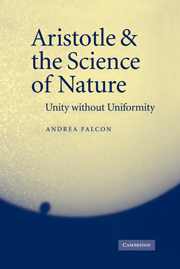Epilogue
Published online by Cambridge University Press: 22 September 2009
Summary
There would be no problems for Aristotle,
if one accepted his assumptions regarding the fifth body
(Plotinus, ii 1. 2. 12–13).ARISTOTLE'S LANGUAGE
In antiquity it was common to refer to the celestial simple body as the fifth body, the fifth substance, the fifth element, the fifth nature, or even the fifth genus. This language strongly suggests that there was a tendency to think of the celestial simple body as an additional body. In all probability, from very early on, the view that earth, water, air, and fire were the simple bodies out of which the other bodies are made was largely accepted and relatively uncontroversial. Disagreement was confined to the existence of a celestial simple body. This body was perceived as an innovation whose need was not transparent to everyone and called for an explanation. In other words, from very early on, the scope of the debate was narrowed down to, and focused on, the need for another body alongside earth, water, air, and fire. At the beginning of the DC, however, it is an entirely open question how many simple bodies or elements there are. It is only in the course of the argument that Aristotle comes to the conclusion that there is a celestial simple body which is naturally moving in a circle along with four sublunary simple bodies which naturally perform rectilinear motion.
- Type
- Chapter
- Information
- Aristotle and the Science of NatureUnity without Uniformity, pp. 113 - 121Publisher: Cambridge University PressPrint publication year: 2005



